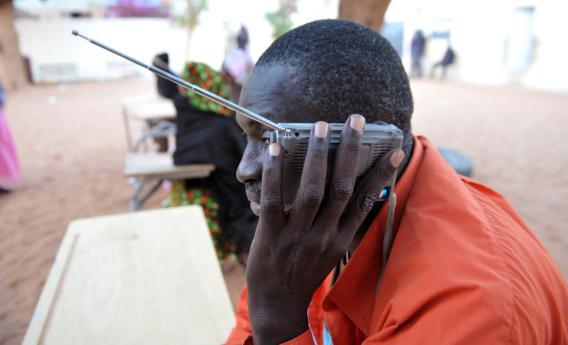If you’re reasonably altruistic, it seems you can’t open Twitter without hearing about a new initiative or organization dedicated to leveraging mobile telephony for social good in the developing world. The fruits of these efforts run the gamut from maternal health to banking, and crisis relief. They take the form of apps, SMS-based systems, and information dissemination lists. And they vary dramatically in their thoughtfulness, effectiveness, and ability to involve the communities they’re trying to help.
The thing is, despite all of the hype swirling around the role of mobile phones in the Global South, few people have examined the ways in which mobile technology can be partnered with existing, tried-and-true communications networks like radio. My aim here is not to defend or dismiss the role of mobile phones in the developing world—plenty of people have done that already. Rather, it’s time for us to admit that when it comes to global development, mobile phones won’t cut it on their own. If we really want to use technology to promote lasting social change and economic growth, we need to stop ignoring the power of established communications networks. We need to start talking about the radio.
Why radio? For starters, radio’s continued reach, affordability, and attention to local communities is unparalleled. It is “the mass media that reaches the widest audience in the world,” UNESCO proclaimed in conjunction with its 2011 “World Radio Day.” Even in Kenya, Bangladesh, and other hotbeds of mobile development work, radio continues to play a crucial role. This is especially true in rural areas where local dialects are common and literacy isn’t the norm.
Take, for example, the coastal regions of Bangladesh, where community radio stations play a crucial role in mitigating flood damage and risk. Since 2010, 14 new stations have been approved in Bangladesh, and applications for more than 20 others have been filed. These stations are especially useful for residents living in flood prone areas, many of whom carry cheap radio sets with them at all times. Given that many of these communities are centered around farming and fishing, radio’s ability to provide immediate information on local weather patterns and disaster relief strategies is indispensable.
So radio is important—but not perfect. Although community radio stations often involve local residents in programming and long-term planning, getting real-time feedback from listeners can be challenging. Voice calls are expensive, and stations have a limited time to take calls from their audiences. This is where mobile telephony and text messaging can be a game changer, transforming radio listeners into active participants.
Another example: FrontlineSMS, an organization devoted to leveraging mobile phones for development. Unlike similar organizations, Frontline has devoted significant resources to radio initiatives. Frontline’s platform has been used by community radio stations like Radio Mudzi Wathu in Malawi, which uses Frontline SMS to solicit questions, comments, and ideas from listeners. During prime listening hours, Radio Mudzi asks its audience questions like “why do you think that HIV/AIDS is increasing despite interventions?” and asks them to text their responses. They then aggregate the responses, analyze them, and take them to local policymakers and aid workers.
In addition to facilitating audience participation, SMS-oriented radio initiatives allow for unprecedented levels of audience research. After receiving feedback on any given issue, stations have a repository of information that they can analyze and look back on in order to better serve needs of audience. As they identify trends, needs, and concerns, radio stations can catalyze a profoundly fruitful cycle, using more relevant programming to drive audience engagement, thereby soliciting more feedback and dialogue.
So how can we encourage more hybrid radio/mobile projects? First of all, we need to adjust the way we approach technology intended for the developing world. When designing, funding, researching, or discussing technology for development projects, we need to stop being fixated on one technology or platform and instead consider how new technology can be integrated with existing needs, values, and networks.
Secondly, we need to push for policies that promote access to technology for the poorest of the poor. Where radio is concerned, this means pushing for spectrum reform and streamlining licensing for community radio stations. A recent post in the Wall Street Journal’s LiveMint blog highlights the ways in which India’s media policies make it tough for marginalized communities to access communications networks. Bemoaning the “arduous” nature of obtaining radio licenses and prohibitively high spectrum fees, the article calls for streamlining the radio licensing process and making spectrum allocation more transparent. Where mobiles are concerned, we need to push for policies that reduce barriers to entry for the poorest of the poor. As Sascha Meinrath and Jamie Zimmerman have noted on Future Tense, unless governments incentivize telecom companies to build out infrastructure in rural and underserved areas, the power of mobile telephony will remain unharnessed.()
Will hybrid mobile/radio projects save the developing world? No, not at all. As we move into an increasingly sophisticated technological future, however, hybrid projects represent the possibility of using existing networks to bridge social, economic, and technological gaps. As the digital divide skyrockets within and between countries, hybrid projects may be our best chance at making the most of technology.
